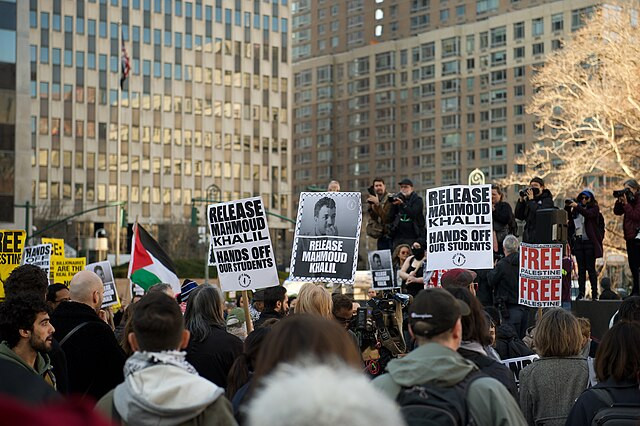A federal judge in New York has temporarily blocked the deportation of Mahmoud Khalil, a Palestinian activist and former Columbia University student, after immigration authorities detained him on Saturday. Khalil, a prominent leader in Columbia's pro-Palestinian student movement, was arrested by federal agents, who cited an order from the U.S. State Department revoking his legal residency.
"To preserve the Court's jurisdiction pending a ruling on the petition, Petitioner shall not be removed from the United States unless and until the Court orders otherwise," the judge wrote in Monday's filing. The decision halts any immediate efforts by the Trump administration to deport Khalil until a court conference scheduled for Wednesday.
Khalil's arrest marks an escalation of President Donald Trump's pledge to take action against foreign students who participated in campus protests against Israel's military operations in Gaza. "This is the first arrest of many to come," Trump wrote on social media Monday. "We know there are more students at Columbia and other universities across the country who have engaged in pro-terrorist, anti-Semitic, anti-American activity, and the Trump administration will not tolerate it."
Khalil, who completed his master's degree in December, was at the forefront of Columbia's student-led anti-war movement last year. The demonstrations, which called for a ceasefire in Gaza and demanded that the university divest from companies linked to Israel's military operations, sparked national controversy and led to disciplinary actions against dozens of students.
Amy Greer, Khalil's attorney, condemned the arrest as a politically motivated effort to suppress student activism. "ICE's arrest and detention of Mahmoud follows the U.S. government's open repression of student activism and political speech, specifically targeting students at Columbia University for criticism of Israel's assault on Gaza," Greer said.
According to multiple sources, Khalil was first held at the Elizabeth Detention Center in New Jersey before being transferred to the Central Louisiana ICE Processing Center in Jena, Louisiana. Immigrant rights groups say such transfers make legal defense more difficult by isolating detainees from their attorneys and support networks.
Legal experts argue that the case raises significant due process concerns. "There is a question of whether due process is going to happen here or for anyone else," said Camille Mackler, executive director of Immigrant ARC, a coalition of legal service providers in New York. She added, "We are seeing the Trump administration use the power of government to go after people or institutions they do not like or agree with. In a free society, that shouldn't happen."
The Trump administration based Khalil's arrest on a provision in the Immigration and Nationality Act, which allows the government to deport individuals whose presence is deemed to have "potentially serious adverse foreign policy consequences for the United States." John Sandweg, former acting director of ICE, said the use of this provision against a green card holder is rare. "The administration may also be relying on another provision that arguably allows ICE to deport someone when the Secretary of State has reasonable ground to believe that the person's presence or activities in the U.S. present serious adverse foreign policy consequences," Sandweg said.
Activists and legal advocates have condemned Khalil's detention as a direct attack on political dissent. "This arrest is unprecedented, illegal, and un-American," said Ben Wizner, director of the American Civil Liberties Union's Speech, Privacy, and Technology Project. "The federal government is claiming the authority to deport people with deep ties to the U.S. and revoke their green cards for advocating positions that the government opposes."
Protests erupted in New York City following Khalil's arrest, with hundreds marching in Lower Manhattan demanding his release. Meanwhile, Columbia University confirmed that reports of ICE activity around campus had surfaced but stated that it "has and will continue to follow the law." A town hall for students seeking legal guidance has been scheduled for Wednesday.
Khalil's case comes amid broader efforts by the Trump administration to crack down on pro-Palestinian student activism. Secretary of State Marco Rubio stated on social media that "the visas and/or green cards of Hamas supporters" will be revoked so they "can be deported." Columbia University was also among 60 U.S. colleges and universities warned by the Department of Education that failure to protect Jewish students from harassment could result in federal funding cuts.
Robert Cohen, a professor at New York University and an expert on student activism, warned that the administration's sweeping language could have dangerous consequences. "To act as if everybody in the movement is supporting Hamas is a vast oversimplification," Cohen said. "Most people involved in the movement were opposed to the war because of the fact that there were a lot of civilians dying, a lot of innocent people were getting killed."
New York Attorney General Letitia James expressed concern over Khalil's arrest, stating that her office is monitoring the situation and is in contact with his attorney. Civil rights organizations, including the New York Civil Liberties Union and the Council on American-Islamic Relations, have also called for Khalil's immediate release.






